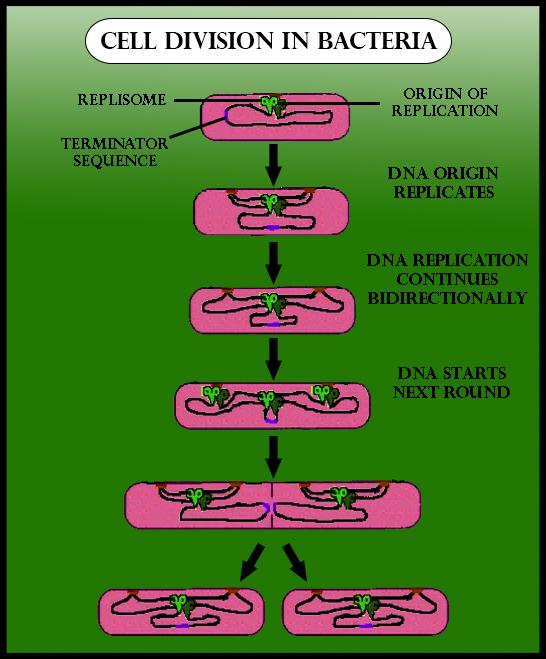
DNA replication in bacteria occurs
(a)Just before transcription
(b)During S Phase
(c)Within nucleolus
(d)Prior to fission
Answer
582.6k+ views
Hint: New DNA arises from the parent DNA in the DNA replication process. Because of their primitive existence, prokaryotes don't show well defined S-phase. DNA replication is bidirectional from the site of origin of replication. In bacteria, DNa replication occurs before the division of a single entity.
Complete answer:
In bacteria, DNA replication occurs before the onset of the process of fission. The DNA in bacteria is replicated with the help of mesosomes that are the infoldings of the bacterial plasma membrane.
For propagation, the majority of bacteria depend on binary fission. This is a simple operation, conceptually; a cell just needs to expand to twice its starting size and then break into two. But for a bacterium to remain viable and competitive, it must divide at the right time, in the right place, and provide a full copy of its essential genetic material to each offspring.
Additional information:
To start replication of DNA, unwinding enzymes called DNA helicases cause short segments of the two-parent DNA strands to unwind and separate at the origin of replication, forming two replication forks in the form of "Y." These forks of replication are the true site of copying DNA. All the proteins involved in the replication of DNA aggregate at replication forks to form a replication complex called replisome.
So, the correct answer is, 'Prior to fission'.
Note: DNA is typically replicated by uncoiling the helix, separating the strands by breaking the hydrogen bonds between the complementary strands, and synthesizing two new strands by complementary base pairing. Replication starts at a particular DNA site, called the origin of replication (oriC). DNA replication is a very important part of the cell cycle and, when the DNA of the cell replicates, all the cells energy is devoted to replication, the cell does no other major or drastic functions during this period.

Complete answer:
In bacteria, DNA replication occurs before the onset of the process of fission. The DNA in bacteria is replicated with the help of mesosomes that are the infoldings of the bacterial plasma membrane.
For propagation, the majority of bacteria depend on binary fission. This is a simple operation, conceptually; a cell just needs to expand to twice its starting size and then break into two. But for a bacterium to remain viable and competitive, it must divide at the right time, in the right place, and provide a full copy of its essential genetic material to each offspring.
Additional information:
To start replication of DNA, unwinding enzymes called DNA helicases cause short segments of the two-parent DNA strands to unwind and separate at the origin of replication, forming two replication forks in the form of "Y." These forks of replication are the true site of copying DNA. All the proteins involved in the replication of DNA aggregate at replication forks to form a replication complex called replisome.
So, the correct answer is, 'Prior to fission'.
Note: DNA is typically replicated by uncoiling the helix, separating the strands by breaking the hydrogen bonds between the complementary strands, and synthesizing two new strands by complementary base pairing. Replication starts at a particular DNA site, called the origin of replication (oriC). DNA replication is a very important part of the cell cycle and, when the DNA of the cell replicates, all the cells energy is devoted to replication, the cell does no other major or drastic functions during this period.

Recently Updated Pages
Master Class 11 Computer Science: Engaging Questions & Answers for Success

Master Class 11 Business Studies: Engaging Questions & Answers for Success

Master Class 11 Economics: Engaging Questions & Answers for Success

Master Class 11 English: Engaging Questions & Answers for Success

Master Class 11 Maths: Engaging Questions & Answers for Success

Master Class 11 Biology: Engaging Questions & Answers for Success

Trending doubts
One Metric ton is equal to kg A 10000 B 1000 C 100 class 11 physics CBSE

There are 720 permutations of the digits 1 2 3 4 5 class 11 maths CBSE

Discuss the various forms of bacteria class 11 biology CBSE

Draw a diagram of a plant cell and label at least eight class 11 biology CBSE

State the laws of reflection of light

Explain zero factorial class 11 maths CBSE




